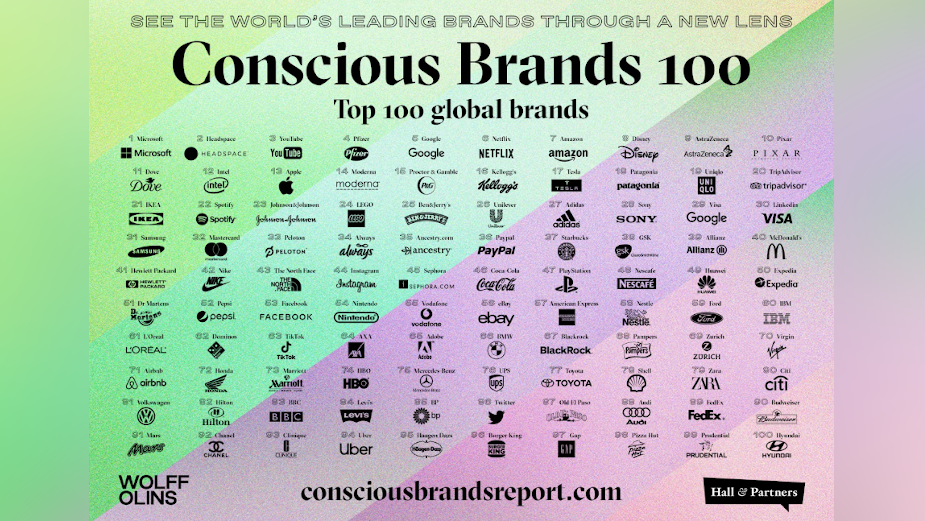
Google, AstraZeneca, Microsoft and the BBC top UK 100 Most Conscious Brands List

Google tops the Conscious Brands 100, Wolff Olins and Hall & Partners’ inaugural list of the UK’s 100 most conscious brands.
The Conscious Brands 100 was created in light of increased consumer demand for brands not only to act more responsibly (to be ethical, sustainable and prepared to take a stand on moral and social issues) but to be more responsive to peoples’ identities, moods and cultures.
AstraZeneca comes in second on the list, followed by Microsoft, the BBC and YouTube respectively.
The global rankings of the 100 most conscious brands saw Microsoft topping the worldwide list, followed by Headspace, YouTube and Pfizer respectively.
The ranking defines conscious brands as those that are responsive to people’s needs, moods and culture and that also take responsibility by helping people, communities and the planet.
The report shows that the pandemic has changed what we value, with consumers prioritising physical and mental health, communication, convenience, human connection and entertainment.
The list scores brands according to six key criteria: empathy, reform, habit, multisensory, collectivism and morality (the six signs of a Conscious Brand, which you can read more about here) through a global survey of 9,000 consumers rating 230 brands in the UK, the US and China.
In the UK, Google came out top for its importance in people’s daily lives and scored highly for ‘always finds new ways to inspire me’. It also scored highly for ‘truly embraces diversity and inclusion’ and Google’s CEO Sundar Pichai (who rose through the ranks to become the company's CEO in 2015) was ranked as one of the world’s most inspirational CEOs. Google’s strong cultural relevance was also noted, no surprise given that ‘Coronavirus’ was the most searched for term globally and ‘how to cut your hair’ reached an all time high, along with recipes for banana bread, according to the Google Year of Search in 2020 report.
AstraZeneca, the British-Swedish pharmaceuticals company behind the Covid-19 vaccine, ranked far and away as the leading brand in terms of ‘makes the world a better place’ - an ambition that many brands have blithely thrown around prior to 2020. And despite this research taking place in the middle of concerns over blood clots and regional pauses to its roll-out, the UK still holds the brand in incredibly high esteem, marking it highly for driving ‘reform and social change’ and being ‘guided by strong beliefs’.
Microsoft also scored highly due to its importance in people’s lives, with Microsoft Teams enabling workers to continue their role safely. Microsoft also leveraged technology to help those on the front lines of research into COVID-19 and, in 2020 alone, donated $1.9bn to non-profits, nearly $4bn to diverse-owned businesses and reduced its supplier carbon footprint by 21m metric tons of CO2e.
The BBC scored well with consumers for playing an important role in daily life and being guided by strong beliefs; and YouTube performed strongly for its use of storytelling and video to educate people on sustainability.
Headspace ranked highly, at no. six, for its focus on improving health and happiness through meditation and mindfulness. Pharma brand Pfizer also saw a ‘Covid bump’ in popularity, coming in at nine. Among the top brands Oatly’s performance also stands out, ranking at number eight, impressive given the brand’s relative youth and the fact that its in a consumer goods category (alternative milks) not renowned for achieving such cultural impact.
Categories that performed best were tech and entertainment. Brands that surprised by performing poorly on the index included Twitter and Facebook, which both did especially poorly on moral performance.
Poorly performing categories were airlines/travel; mobility; fashion; luxury; alcohol and finance. Brands that bucked the trend in these categories included TripAdvisor in travel, Adidas in fashion and PayPal in finance.
The findings show conscious brands take action across all aspects of the business; drive action internally and externally; and have authentic ‘conscious-ness’ in their DNA.
Sairah Ashman, global CEO at Wolff Olins, said: “There’s no doubt that 2020 marked a dramatic shift in what we value and what’s essential to us as consumers. Unsurprisingly, it’s the brands that helped us to stay connected and healthy or keep boredom at bay that we’ve come to rely on and value the most. Although the success of a brand like Headspace going globally mainstream points to the rise of a more conscious brand and consumer.
It’s also inspiring to see how quickly relatively young brands like Oatly have won over consumers at a more local level. And it will certainly be interesting to see if the big pharmaceutical brands can sustain the Covid bump they’re currently experiencing.”
Commenting on the launch of the inaugural Conscious Brands 100 index, global CEO Vanella Jackson, Hall & Partners said: “There is a growing need and opportunity for brands to show leadership and bring consciousness into their brand and marketing strategies. And, in doing so, help create a virtuous cycle of doing good between business, brands and consumers.
The ongoing challenge for brands is to connect to their unique role and contribution as a business, clearly linking to their DNA. And doing this consistently and authentically. Anything else risks tokenism. Getting this right means staying even closer to customers, as businesses start to rebuild.”
Link to the report.













